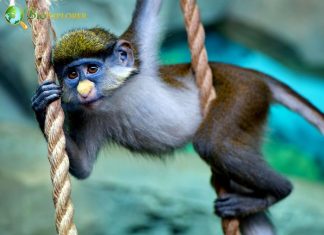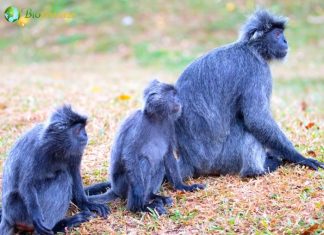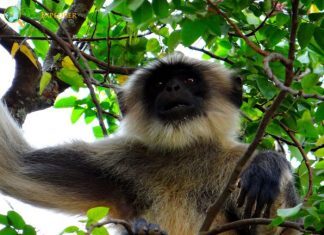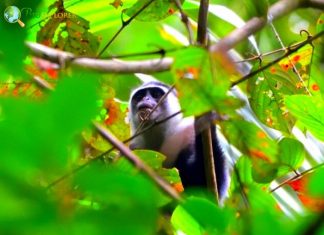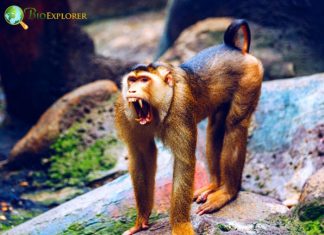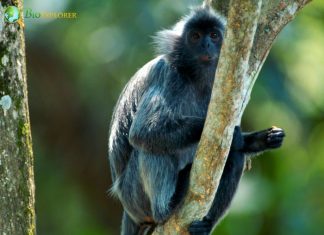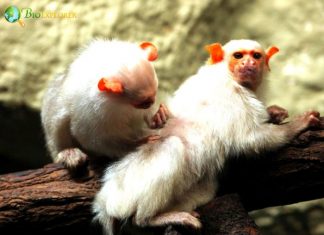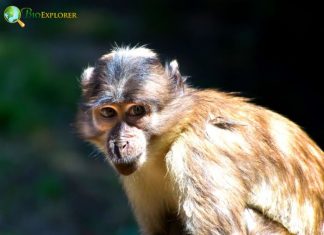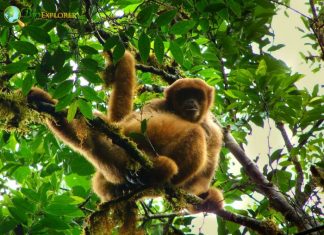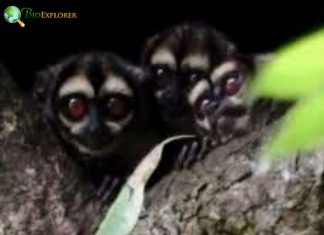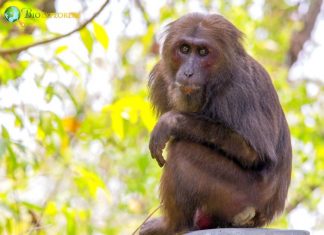Saban Grizzled Langur
Species Name: Presbytis sabana
Saban Grizzled Langur was once thought to be a subspecies of the Hose's langur, Presbytis hosei (as Presbytis hosei sabana). The Saban grizzled langur is endemic to the island of Borneo in the Malaysian province of Sabah, with part of its range in Indonesia.
Sanje Mangabey
Species Name: Cercocebus sanjei
Sanje mangabey, also called the Sanje crested mangabey and Sanje River mangabey, are Old World monkeys endemic to Tanzania, a sovereign state in East Africa. Some Sanje mangabeys prefer their own company to that of others and live alone.
Santa Marta White-fronted Capuchin
Species Name: Cebus malitiosus
The Santa Marta white-fronted capuchin (Cebus malitiosus) is a species of gracile capuchin monkey native to Colombia. The Santa Marta white-fronted capuchin range is restricted to forests near northern Colombia's northwestern base of the Sierra de Santa Marta.
Santarem Marmoset
Species Name: Mico humeralifer
The Santarem marmoset (Mico humeralifer), also called the black-and-white tassel marmoset, is a marmoset native to the Amazon and Pará states of Brazil. Santarem marmosets make long cries with their rapidly vibrating tongue, designed to sound like a cricket, and shorter chirps.
Satéré Marmoset
Species Name: Mico saterei
The Satéré marmoset (Mico saterei) is native to Brazil and its genus is characterized by claw-like nails rather than the flat nails of other primates, long lower incisors, a specialized caecum, and squirrel-like movements in trees.
Schmidt’s Red-tailed Monkey
Species Name: Cercopithecus ascanius
The Schmidt's red-tailed monkey, also called the red-tailed guenon, Schmidt's guenon, or black-cheeked white-nosed monkey is a primate species in the Cercopithecidae family. The Schmidt's red-tailed monkey is named for its red coloration on the underside of its tail, as well as the bicolor coloration of its tail as the reddish color increases from the base to the tip.
Sclater’s Guenon
Species Name: Cercopithecus sclateri
(Cercopithecus sclateri), also called the Sclater monkey and Nigerian monkey is an Old-World monkey. Sclater's guenon is an Old-World monkey first described by Reginald Innes Pocock in 1940 and named for zoologist and ornithologist Philip Sclater.
Selangor Silvered Langur
Species Name: Trachypithecus selangorensis
The Selangor silvered langur (Trachypithecus selangorensis) is a leaf monkey living on the west coast of the Malay Peninsula. Like most leaf monkeys, the Selangor silvered langur usually lives in groups of a single adult male and several adult females and their young offspring.
Semliki Red Colobus
Species Name: Piliocolobus semlikiensis
The Semliki red colobus (Piliocolobus semlikiensis) is native to central Africa. The Semliki red colobus lives in the ironwood forest of the northeastern Democratic Republic of the Congo between the Rwenzori Mountains and the Semliki River valley.
Shan State Langur
Species Name: Trachypithecus melamerus
Shan State Langur was generally considered a subspecies or a synonym of Phayre's leaf monkey (Trachypithecus phayrei) until Roos et al. elevated it to species status in 2020.
Shock-headed Capuchin
Species Name: Cebus cuscinus
The shock-headed capuchin (Cebus cuscinus) is a gracile capuchin monkey native to Peru and Bolivia. This New-world monkey was previously classified as a subspecies of the Humboldt's capuchin (Cebus albifrons), but in 2013 Rylands and Mittermeier raised it to a separate species, following genetic studies done by Boubli et al. in 2012, and Lynch Alfaro et al. in 2010.
Shortridge’s Capped Langur
Species Name: Trachypithecus shortridgei
The Shortridge's capped langur (Trachypithecus shortridgei) is a colobine primate inhabiting low to medium evergreen and semi-evergreen forests east of the Chindwin River in northeastern Myanmar and southwestern Myanmar, China, in the Nu and Dulong valleys.
Siberut Langur
Species Name: Presbytis siberu
Siberut langurs are native to the islands of North Pagai, South Pagai, and Sipora. Siberut langurs spend over 80 percent of their time resting and foraging and only a tiny portion traveling and socializing.
Siberut Macaque
Species Name: Macaca siberu
The Siberut macaque (Macaca siberu) is an endangered macaque species native to the island of Siberut in Indonesia. It was previously thought to be conspecific with the Pagai Island macaque (Macaca pagensis), which is paler overall, but this arrangement was polyphyletic.
Sierra De Perijá White-fronted Capuchin
Species Name: Cebus leucocephalus
The Sierra de Perijá white-fronted capuchin monkey (Cebus leucocephalus) is a species of gracile capuchin monkey native to Venezuela and Colombia. The Sierra de Perijá white-fronted capuchin range is restricted to northwestern Venezuela and northern Colombia forests.
Silvered Langur
Species Name: Trachypithecus cristatus
The silvery Lutung (Trachypithecus cristatus), also called the silvery langur or silvered leaf monkey is an Old-World monkey. Silvery Lutungs primarily live in trees.
Silvery Brown Bare-face Tamarin
Species Name: Saguinus leucopus
The white-footed tamarin (Saguinus leucopus), the silvery-brown bare-faced tamarin, is native to Colombia. It is silvery brown with pale stripes and reddish underparts. It closely resembles the cotton-tipped tamarin from which it is separated by the Atrato River.
Silvery Marmoset
Species Name: Mico argentatus
The Silvery marmoset (Mico argentatus) is a New-World monkey living in the eastern Amazon rainforest of Brazil. True to its name, the silvery marmoset's body is a striking silver-grey color. Silvery marmosets are primarily arboreal species and can spend their entire lives in trees without descending to the ground.
Sooty Mangabey
Species Name: Cercocebus atys
The sooty mangabey, also called the white-collared or white-crowned mangabey is a predominantly terrestrial Old-World monkey. Sooty mangabeys remember the location of the fallen fruit and can tell whether or not a tree is bearing fruit.
Southern Muriqui
Species Name: Brachyteles arachnoides
The southern muriqui or woolly spider monkeys (Brachyteles arachnoides) are scattered across southeastern Brazil, from Bahia north to Sao Palo south. The southern muriqui is one of the largest primates in South America, with males weighing around 15 kg and females around 12 kg.
Spix’s Night Monkey
Species Name: Aotus vociferans
The Spix's night monkey (Aotus vociferans), also called the Spix's owl monkey, Colombian gray nocturnal monkey, and noisy night monkey is a species of night monkey native to South America.
Spix’s Red-handed Howler
Species Name: Alouatta discolor
Spix's Red-Handed Howler (Alouatta discolor) is a species of howler monkey endemic to the southeastern Amazon in Brazil. Spix's Red-headed Howler is currently on the International Union for Conservation of Nature's Endangered Species List based on a population decline of more than 30% over the last 3 generations, mainly due to habitat loss.
Spix’s White-fronted Capuchin
Species Name: Cebus unicolor
Spix's White-fronted Capuchin (Cebus unicolor) is a species of a gracile capuchin monkey. The species is widespread in the upper Amazon basin in Peru and Brazil. It is also present in northern Bolivia. According to the genetic studies by Boubli et al., Ryland and Mittermeier elevated it to a distinct species.
Stephen Nash’s Titi
Species Name: Plecturocebus stephennashi
Stephen Nash's Titi (Plecturocebus stephennashi), also known as Stephen Nash's monkey or Nash's Titi, is a species of Titi in the family Pitheciidae. This Brazilian monkey was discovered by Marc van Roosmalen in 2001 when local fishermen brought specimens to his breeding center. It was officially described in 2002.
Stump-tailed Macaque
Species Name: Macaca arctoides
The stump-tailed macaque, also known as the bear macaque, is an Old World monkey endemic to Cambodia, northeastern India, southwestern China, Myanmar, and Laos, from northwestern Peninsular Malaysia, Vietnam, and Thailand.
Sun-Tailed Monkey
Species Name: Allochrocebus solatus
The sun-tailed monkey (Allocrocebus solatus) is among the most understudied primates in its habitat. Discovered as a new species in 1988, it is classified as a guenon, a member of the Cercopithecus genus, but later moved to the Allochrocebus genus.
Suggested Reading: Different Breeds of Monkeys







